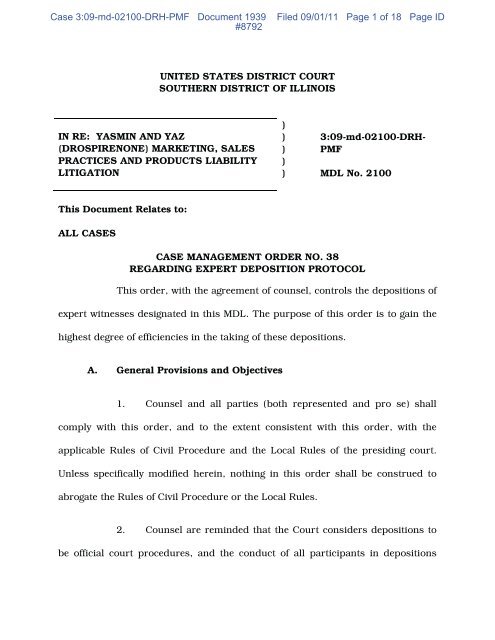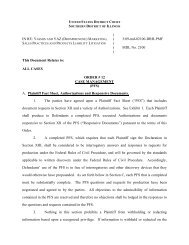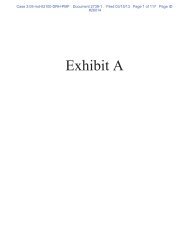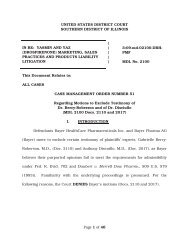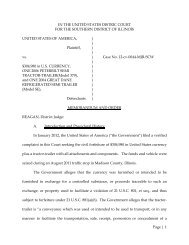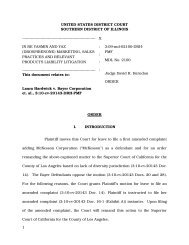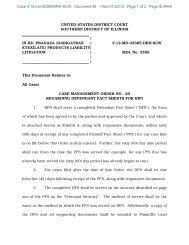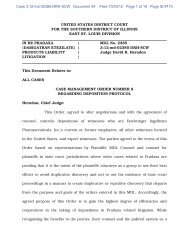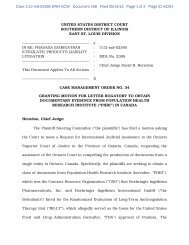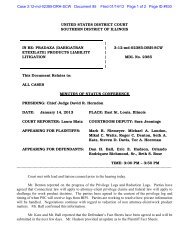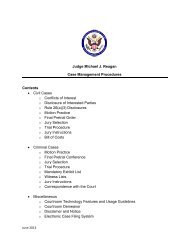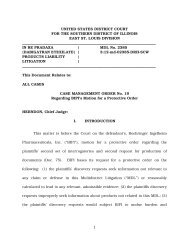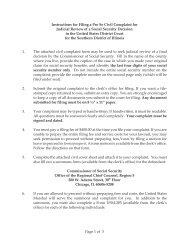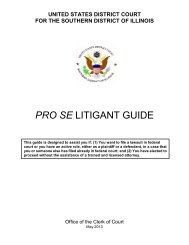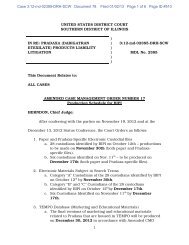Order No. 38 - Regarding Expert Deposition Protocol - Southern ...
Order No. 38 - Regarding Expert Deposition Protocol - Southern ...
Order No. 38 - Regarding Expert Deposition Protocol - Southern ...
You also want an ePaper? Increase the reach of your titles
YUMPU automatically turns print PDFs into web optimized ePapers that Google loves.
Case 3:09-md-02100-DRH-PMF Document 1939<br />
#8792<br />
Filed 09/01/11 Page 1 of 18 Page ID<br />
UNITED STATES DISTRICT COURT<br />
SOUTHERN DISTRICT OF ILLINOIS<br />
IN RE: YASMIN AND YAZ<br />
(DROSPIRENONE) MARKETING, SALES<br />
PRACTICES AND PRODUCTS LIABILITY<br />
LITIGATION<br />
)<br />
)<br />
)<br />
)<br />
)<br />
3:09-md-02100-DRH-<br />
PMF<br />
MDL <strong>No</strong>. 2100<br />
This Document Relates to:<br />
ALL CASES<br />
CASE MANAGEMENT ORDER NO. <strong>38</strong><br />
REGARDING EXPERT DEPOSITION PROTOCOL<br />
This order, with the agreement of counsel, controls the depositions of<br />
expert witnesses designated in this MDL. The purpose of this order is to gain the<br />
highest degree of efficiencies in the taking of these depositions.<br />
A. General Provisions and Objectives<br />
1. Counsel and all parties (both represented and pro se) shall<br />
comply with this order, and to the extent consistent with this order, with the<br />
applicable Rules of Civil Procedure and the Local Rules of the presiding court.<br />
Unless specifically modified herein, nothing in this order shall be construed to<br />
abrogate the Rules of Civil Procedure or the Local Rules.<br />
2. Counsel are reminded that the Court considers depositions to<br />
be official court procedures, and the conduct of all participants in depositions
Case 3:09-md-02100-DRH-PMF Document 1939<br />
#8793<br />
Filed 09/01/11 Page 2 of 18 Page ID<br />
shall be in accordance with the customs and practices expected of lawyers and<br />
witnesses, as if each was appearing personally before the Court at the time of the<br />
depositions. Counsel shall not at any time conduct himself or herself in a manner<br />
not becoming an officer of the court and not in full compliance with the civil rules<br />
of practice and all other orders of the Court. Neither counsel nor witnesses shall,<br />
at any time, engage in conduct that impedes, delays, or frustrates the examination<br />
of the witness. All counsel and the deponent must be treated with civility and<br />
respect.<br />
3. There shall be no smoking or use of other tobacco products in<br />
any room in which a deposition is being conducted, including before, during or<br />
after a deposition, or in the deposition room during the deposition recesses.<br />
4. Plaintiffs and Bayer have named the same generic experts for<br />
the bellwether trials in the coordinated proceedings in this Court, Pennsylvania,<br />
and New Jersey. Disputes relating to generic expert depositions shall be resolved<br />
jointly by the Courts, wherever possible. Where possible, Chief Judge Herndon<br />
will coordinate communications among the Courts. More specifically:<br />
If a dispute arises before or after a deposition of a generic expert:<br />
Promptly upon filing a motion in the court in which her case is pending, the<br />
moving party will email a copy of the motion to Judge Herndon and his<br />
staff as follows: Sandy Pannier, Courtroom Deputy<br />
(Sandy_Pannier@ilsd.uscourts.gov); Debra Ward, Chambers Counsel<br />
2
Case 3:09-md-02100-DRH-PMF Document 1939<br />
#8794<br />
Filed 09/01/11 Page 3 of 18 Page ID<br />
(Debra_Ward@ilsd.uscourts.gov); and Judge Herndon<br />
(Judge_Herndon@ilsd.uscourts.gov). Copies of the request, together with<br />
the supporting documents, shall be emailed to the counsel involved in the<br />
immediate dispute, and the leadership of defendants and of plaintiffs for<br />
each jurisdiction, as noted below. 1<br />
Judge Herndon will coordinate<br />
conferral among the Courts for resolution of the issue, consistent with the<br />
law of the various jurisdictions.<br />
If a dispute arises during a deposition that requires expedited<br />
consideration: The moving party will send a short email to the state court<br />
judge and Chief Judge Herndon, his staff, the parties’ leadership groups as<br />
set forth above, and counsel attending the deposition describing briefly the<br />
nature of the dispute. The state court judge and Judge Herndon will<br />
consult with the judges from the other jurisdictions, provided that each<br />
such judge is available and that the inherent need of the dispute for an<br />
immediate ruling does not prevent such consultation. The acting judicial<br />
officer shall issue a ruling resolving the dispute in a timely manner,<br />
1 <strong>No</strong>tices to plaintiffs shall be made by e-mail to each of the following: for the MDL, Roger<br />
Denton (rdenton@uselaws.com), Michael Burg (mburg@burgsimpson.com), Michael London<br />
(mlondon@douglasandlondon.com), and Mark Niemeyer (niemeyer@onderlaw.com); for New<br />
Jersey state court coordinated actions Richard Meadow (rdm@lanierlawfirm.com); and for the<br />
Pennsylvania state court consolidated actions Dianne M. Nast (dnast@rodanast.com) and<br />
Michael M. Weinkowitz (MWeinkowitz@lfsblaw.com).. <strong>No</strong>tices to the Bayer defendants shall<br />
be emailed to Adam Hoeflich (adam.hoeflich@bartlit-beck.com); Doug Marvin<br />
(dmarvin@wc.com); Susan Weber (saweber@sidley.com); and John Galvin<br />
(jgalvin@foxgalvin.com). <strong>No</strong>tice to Barr/Teva should be sent to Joseph Thomas<br />
(jthomas@ulmer.com).<br />
3
Case 3:09-md-02100-DRH-PMF Document 1939<br />
#8795<br />
Filed 09/01/11 Page 4 of 18 Page ID<br />
advising the parties which of the state judicial officers participated in the<br />
decision. If a state judge is unable to participate in a decision requiring<br />
expedited consideration and the aggrieved party’s case is pending in that<br />
state, Judge Herndon may resolve the dispute but the losing party may<br />
within 24 hours file a motion in that state’s coordinated proceeding<br />
explaining the basis for that party’s disagreement with the ruling. A copy of<br />
the motion promptly shall be emailed to Judge Herndon, each state court<br />
judge and the parties’ leadership groups, as set forth above.<br />
If a dispute arises relating to the deposition of a case-specific witness in<br />
a federal court case, that dispute will be resolved by this Court. Counsel<br />
shall use the procedures set forth above to notify the Court of such a<br />
dispute. 2<br />
5. The Honorable Dan Stack (Ret.) will serve as Special Master<br />
for the purpose of mediating and, if necessary, issuing preliminary suggested<br />
rulings on disputes that arise during the course of depositions of expert<br />
witnesses. The Special Master shall have the rights, powers and duties provided<br />
in Rule 53, and may adopt such procedures as are not inconsistent with that Rule<br />
or with this or other <strong>Order</strong>s of the Court. The Special Master shall endeavor first<br />
to mediate a resolution to disputes that may arise. Should mediation fail to result<br />
2 This order does not apply to case-specific expert witness in a state court case, unless the state<br />
court adopts this order and then any disputes arising during a state case-specific witness<br />
deposition shall be considered by the state court judge or discovery master ie. Discovery Master<br />
Bock in the Pennsylvania litigation.<br />
4
Case 3:09-md-02100-DRH-PMF Document 1939<br />
#8796<br />
Filed 09/01/11 Page 5 of 18 Page ID<br />
in an agreed upon resolution, the Special Master shall make preliminary rulings<br />
that, at the election of any party, may be referred to this Court. If judicial review<br />
of the Special Master’s suggested preliminary rulings is required, the parties shall<br />
bring their disputes to the Court pursuant to the procedures set forth above. The<br />
Special Master’s fees and expenses shall be paid in accordance with CMO 30 <br />
2.B.<br />
B. <strong>No</strong>tices/Scheduling<br />
1. Content of <strong>No</strong>tice. Each deposition notice shall include the<br />
name, address and telephone number of an attorney point of contact designated<br />
by the party noticing the deposition as well as the date, time and place of the<br />
deposition.<br />
2. Cooperation in Scheduling. Absent extraordinary<br />
circumstances, counsel shall consult with opposing counsel and counsel for<br />
proposed deponents in an effort to schedule depositions at mutually convenient<br />
times and locations. Counsel are expected to cooperate and coordinate the<br />
scheduling of depositions on a good faith basis.<br />
3. Location. Counsel shall cooperate in determining the location<br />
of expert witness depositions, which shall take place in the deponent’s home<br />
district or another district convenient to the deponent, counsel and the parties.<br />
The party presenting an expert for deposition will make office space available,<br />
along with break-out rooms for both sides whenever possible. If office space is<br />
5
Case 3:09-md-02100-DRH-PMF Document 1939<br />
#8797<br />
Filed 09/01/11 Page 6 of 18 Page ID<br />
not available and the deposition needs to take place in a hotel, the cost of renting<br />
the deposition room shall be borne equally and the cost of any break-out room<br />
will be borne by the party desiring a break-out room.<br />
4. Adequacy of <strong>No</strong>tice. After counsel, through consultation, have<br />
arrived on a date and location for a deposition, the <strong>No</strong>ticing Party shall serve an<br />
amended <strong>No</strong>tice reflecting the agreed upon date and location.<br />
5. Production of Documents. <strong>No</strong> later than fourteen (14) days<br />
prior to a scheduled deposition, the party deposing an expert witness may request<br />
production of documents relied upon by the expert that are not (a) publically<br />
available or (b) among the documents produced in this litigation. The request<br />
shall be made for specific documents via email to Roger Denton<br />
(Rdenton@uselaws.com) and Megan Vanderbeek (Mvanderbeek@uselaws.com)<br />
for Plaintiffs’ experts and Joseph Piorkowski (jpiorkowski@lawdoc1.com) and<br />
Brian Prestes (brian.prestes@bartlit-beck.com) for Defendants’ experts. Said<br />
documents shall be produced five (5) days prior to a deposition scheduled in the<br />
United States and seven (7) days prior to a deposition scheduled outside the<br />
United States. This obligation does not limit or replace otherwise existing<br />
discovery obligations, does not include drafts of reports or disclosures protected<br />
pursuant to Fed. R. Civ. P. 26(b)(4)(B), and does not make otherwise privileged or<br />
work product materials discoverable.<br />
6
Case 3:09-md-02100-DRH-PMF Document 1939<br />
#8798<br />
Filed 09/01/11 Page 7 of 18 Page ID<br />
6. Attendance. In order for counsel to make arrangements for<br />
adequate deposition space, Liaison Counsel for the jurisdiction from which the<br />
notice was served and shall confer with the party presenting an expert witness<br />
regarding the expected attendance at least three business days before the<br />
scheduled date.<br />
7. Payment. The party deposing an expert witness shall be<br />
responsible for paying that witness for her/his time at any deposition and<br />
reasonable travel expenses. Such payment shall be made within thirty days of<br />
presentation of a bill and W-9 to Roger Denton (Rdenton@uselaws.com) for<br />
plaintiffs and to Susan Weber (saweber@sidley.com) for Bayer.<br />
8. Remote Participation. In the event that a party wishes to<br />
participate in a deposition remotely, that is, either by telephone or internet, that<br />
party shall notify Plaintiffs’ Liaison Counsel for the jurisdiction from which the<br />
<strong>No</strong>tice was served as well as Defendants’ Liaison Counsel, two days in advance of<br />
the start of the deposition. Any party seeking to participate remotely must agree<br />
to be bound by applicable Protective <strong>Order</strong>s and agree not to re-record the<br />
deposition, by video or audio means.<br />
9. Means of Recording.<br />
a. Stenographic Recording. A certified Court reporter shall<br />
stenographically record all deposition proceedings and testimony. The Court<br />
reporter shall administer the oath or affirmation to the deponent. A written<br />
7
Case 3:09-md-02100-DRH-PMF Document 1939<br />
#8799<br />
Filed 09/01/11 Page 8 of 18 Page ID<br />
transcript by the Court reporter shall constitute the official record of the<br />
deposition for purposes of FED. R. CIV. P. 30(e); N.J. COURT RULES R. 4:16-4;<br />
PA. R.C.P NO. 4017(c) (rules addressing submission of transcript to the<br />
deponent) and 30(f); N.J. COURT RULES R. 4:14-6; PA. R.C.P NO. 4017 (rules<br />
addressing filing, retention, certification and the like). The noticing party shall be<br />
responsible for the court reporter furnishing computer disks in text-readable<br />
form and hard copy in Min-U-Script format to the document depository.<br />
b. Telephonic <strong>Deposition</strong>s. By indicating in its notice of<br />
deposition that it wishes to conduct the deposition by telephone, a party shall be<br />
deemed to have moved for such an order under FED. R. CIV. P. 30(b)(7) or to<br />
have otherwise moved for such an order as permitted in Pennsylvania and New<br />
Jersey. Unless an objection is filed and served within ten (10) calendar days after<br />
such notice is received, the court shall be deemed to have granted the motion.<br />
Other parties may examine the deponent telephonically or in person. However, all<br />
persons present with the deponent shall be identified in the deposition and shall<br />
not by word, sign, or otherwise coach or suggest answers to the deponent.<br />
c. Videotaping. <strong>Deposition</strong> notices shall state whether the<br />
deposition is to be videotaped. All videotape depositions shall proceed pursuant<br />
to the provisions of section I, infra.<br />
8
Case 3:09-md-02100-DRH-PMF Document 1939<br />
#8800<br />
Filed 09/01/11 Page 9 of 18 Page ID<br />
C. Coordination with State Court Actions/Cross-<strong>No</strong>ticing of<br />
<strong>Deposition</strong>s 3 1.<br />
Cross-<strong>No</strong>tices. Generic expert witness depositions in this<br />
litigation subject to this <strong>Order</strong> will be cross-noticed in Pennsylvania, New Jersey<br />
and California state court cases. 4<br />
2. Coordination of <strong>Deposition</strong>s. Counsel from all jurisdictions<br />
shall coordinate the scheduling of depositions and the duties for examination of<br />
the deponent. In the interest of efficiency, the fewest number of attorneys possible<br />
should be used at each deposition.<br />
a. Generic <strong>Expert</strong>s. Under no circumstances shall more<br />
than one attorney from each jurisdiction in which the deposition is noticed<br />
question a witness. It is the obligation of the examining attorneys to confer prior<br />
to the deposition concerning allocation of time to question.<br />
Under no<br />
3 <strong>No</strong>thing in this order is intended to contravene or change state court rules or case management<br />
orders governing the availability of expert depositions including Pa.R.Civ.P. 4003.5.<br />
4 The parties to the coordinated California state court proceedings have not yet disclosed experts<br />
or agreed to a Case Management <strong>Order</strong> regarding expert disclosures and discovery. The parties<br />
have nevertheless agreed that: 1) the depositions of the generic experts taken in these<br />
proceedings will be cross-noticed for the California proceedings to avoid unnecessary<br />
duplication of efforts without prejudice to either party; 2) depositions of these experts shall not<br />
proceed independently in California except for good cause shown (which is defined for these<br />
purposes as (i) the expert has new or supplemental generic opinions; or (ii) the expert is offering<br />
case-specific opinions supplemental to his generic opinions); 3) the parties reserve the right to<br />
designate these experts and/or additional generic experts in the California proceedings, and to<br />
negotiate a separate Case Management <strong>Order</strong> in California regarding expert disclosures and<br />
discovery; and 4) because expert discovery is premature in California at this time, the parties<br />
reserve their rights to challenge the MDL generic experts at a later time under the appropriate<br />
California standard.<br />
9
Case 3:09-md-02100-DRH-PMF Document 1939<br />
#8801<br />
Filed 09/01/11 Page 10 of 18 Page ID<br />
circumstances will the failure of the examining attorneys to allocate time among<br />
themselves or to enforce that allocation of time among themselves during a<br />
deposition result in an extension of the deposition. At no time shall any lawyer<br />
ask questions previously asked by another counsel<br />
one attorney per side per case.<br />
b. Case-Specific <strong>Expert</strong>s. Questioning shall be limited to<br />
3. Subsequent <strong>Deposition</strong>s of Generic <strong>Expert</strong>s. A party may not<br />
take a subsequent deposition of a generic expert witness except for good cause<br />
shown.<br />
Any subsequent deposition shall be restricted to inquiry related to the<br />
developments that necessitated the subsequent deposition, as stipulated to by the<br />
parties, or as permitted by the Courts.<br />
D. Length of <strong>Deposition</strong>s<br />
Unless otherwise ordered by the Courts, or agreed to by the parties,<br />
the following provisions shall govern depositions subject to this order:<br />
1. Generic <strong>Expert</strong>s. <strong>Deposition</strong>s of generic experts shall be<br />
limited to seven (7) hours of opening examination on the video record by the party<br />
who noticed the deposition, which may be followed by an examination by the<br />
producing party that is limited to (1) the scope of initial questioning and (2) no<br />
more than 15 percent of the time of the initial examination. The party who<br />
noticed the deposition may then conduct a re-cross examination limited in scope<br />
10
Case 3:09-md-02100-DRH-PMF Document 1939<br />
#8802<br />
Filed 09/01/11 Page 11 of 18 Page ID<br />
and duration to the producing party’s examination. <strong>No</strong> breaks will be taken while<br />
a question is pending except to confer about an issue related to a claim of<br />
privilege.<br />
2. Case-Specific <strong>Expert</strong>s.<br />
a. <strong>Deposition</strong>s of case-specific experts who have also<br />
submitted a generic report will be limited to three (3) hours of opening<br />
examination on the video record per case by the party who noticed the deposition,<br />
which may be followed by an examination by the producing party that is limited to<br />
(1) the scope of initial questioning and (2) no more than 15 percent of the time of<br />
the initial examination. The party who noticed the deposition may then conduct a<br />
re-cross examination limited in scope and duration to the producing party’s<br />
examination. <strong>No</strong> breaks will be taken while a question is pending except to confer<br />
about an issue related to a claim of privilege.<br />
b. The first deposition of a case-specific expert who has not<br />
also submitted a generic report will be limited to seven (7) hours of opening<br />
examination on the video record per case by the party who noticed the deposition,<br />
which may be followed by an examination by the producing party that is limited to<br />
(1) the scope of initial questioning and (2) no more than 15 percent of the time of<br />
the initial examination. The party who noticed the deposition may then conduct a<br />
re-cross examination limited in scope and duration to the producing party’s<br />
examination. <strong>No</strong> breaks will be taken while a question is pending except to confer<br />
11
Case 3:09-md-02100-DRH-PMF Document 1939<br />
#8803<br />
Filed 09/01/11 Page 12 of 18 Page ID<br />
about an issue related to a claim of privilege. Any subsequent case-specific<br />
deposition of such an expert will be limited to three (3) hours of opening<br />
examination on the video record per case by the party who noticed the deposition,<br />
which may be followed by an examination by the producing party that is limited to<br />
(1) the scope of initial questioning and (2) no more than 15 percent of the time of<br />
the initial examination. The party who noticed the deposition may then conduct a<br />
re-cross examination limited in scope and duration to the producing party’s<br />
examination. <strong>No</strong> breaks will be taken while a question is pending except to confer<br />
about an issue related to a claim of privilege.<br />
3 In the event that a deposition involves a translator, the<br />
maximum length of the deposition shall be increased as reasonably necessary by<br />
up to 75%.<br />
E. Translation of Documents<br />
Objections as to the accuracy of translations shall be preserved<br />
unless a stipulation is reached by the parties in advance of the deposition.<br />
F. Copies of Transcripts and Recordings<br />
1. Each side shall bear its own costs in securing copies of the<br />
deposition transcript, videotape or DVD.<br />
12
Case 3:09-md-02100-DRH-PMF Document 1939<br />
#8804<br />
Filed 09/01/11 Page 13 of 18 Page ID<br />
2. Any party may at its own expense obtain a copy of the<br />
videotape and the stenographic transcript by contacting the Liaison Counsel for<br />
the party noticing the deposition or the court reporter.<br />
G. Postponements<br />
Once a deposition has been scheduled pursuant to Part B., supra, it<br />
shall not be taken off the calendar, rescheduled or relocated less than three (3)<br />
calendar days in advance of the date it is scheduled to occur, except upon<br />
agreement between the party noticing the deposition and Liaison or Lead Counsel<br />
for the opposing party witness or by leave of the Courts for good cause.<br />
H. Attendance<br />
1. Permitted Attendees. Unless otherwise agreed to by the<br />
parties, depositions may be attended only by the parties, the deponent, attorneys<br />
of record in MDL-2100 or state cases, in-house counsel for the parties, court<br />
reporters, videographers, and any person who is assisting in the litigation and<br />
whose presence is reasonably required by counsel. Upon application, and for<br />
good cause shown, the Courts may permit attendance by a person who does not<br />
fall within any of the categories set forth above.<br />
2. Unnecessary attendance by counsel is discouraged and may<br />
not be compensated in any fee application to the court. Counsel who have only<br />
13
Case 3:09-md-02100-DRH-PMF Document 1939<br />
#8805<br />
Filed 09/01/11 Page 14 of 18 Page ID<br />
marginal interest in a proposed deposition or who expect their interests to be<br />
adequately represented by other counsel, should not attend.<br />
3. Examination <strong>Regarding</strong> Confidential Documents. While a<br />
deponent is being examined about any document that has been designated as<br />
confidential pursuant to any court order, attendance at that portion of the<br />
deposition by persons to whom disclosure is not authorized by such order shall<br />
be prohibited. Any portion of the deposition transcript containing confidential<br />
information shall be sealed so as not to waive confidentiality when the transcript,<br />
videotape or disk is placed in the document depository.<br />
I. Image Recorded <strong>Deposition</strong>s<br />
Any deposition may be videotaped at the request of any party<br />
pursuant to the following terms and conditions:<br />
1. Simultaneous Stenographic Recording. All videotaped<br />
depositions shall be simultaneously stenographically recorded in accordance with<br />
paragraph B (9), above.<br />
2. Cost of the <strong>Deposition</strong>. The party requesting videotaping of the<br />
deposition shall bear the expense of both the videotaping and the stenographic<br />
recording. Requests for the taxation of these costs and expenses may be made at<br />
the conclusion of the litigation in accordance with applicable law.<br />
14
Case 3:09-md-02100-DRH-PMF Document 1939<br />
#8806<br />
Filed 09/01/11 Page 15 of 18 Page ID<br />
3. Videotape Operator. The operator(s) of the videotape<br />
recording equipment shall be subject to the applicable provisions of FED. R. CIV.<br />
P. 28(c); N.J. COURT RULES R. 4:14-9; PA. R.C.P. <strong>No</strong>. 4017.1.<br />
4. At the commencement of the deposition the operator(s) shall<br />
swear or affirm to record the proceedings fairly and accurately. The operator<br />
shall produce both video and DVD formats of each deposition.<br />
5. Standards. Unless physically incapacitated, the deponent shall<br />
be seated at a table except when reviewing or presenting demonstrative materials<br />
for which a change in position is needed. To the extent practicable, the deposition<br />
will be conducted in a neutral setting, against a solid background, with only such<br />
lighting as is required for accurate video recording. Lighting, camera angle, lens<br />
setting, and field of view will be changed only as necessary to record accurately<br />
the natural body movements of the deponent or to portray exhibits and materials<br />
used during the deposition. Sound levels will be altered only as necessary to<br />
record satisfactorily the voices of counsel and the deponent.<br />
6. Index. The videotape operator(s) shall use a counter on the<br />
recording equipment and after completion of the deposition shall prepare a log,<br />
cross-referenced to counter numbers, that identifies the depositions on the tape at<br />
which examination by different counsel begins and ends, at which objections are<br />
made and examination resumes, at which exhibits are identified, and at which any<br />
15
Case 3:09-md-02100-DRH-PMF Document 1939<br />
#8807<br />
Filed 09/01/11 Page 16 of 18 Page ID<br />
interruption of continuous tape-recording occurs, whether for recesses, “off-the<br />
record” discussions, mechanical failure, or otherwise.<br />
7. Filing. After the deposition is completed, the video operator<br />
shall certify on camera the correctness, completeness, and accuracy of the<br />
videotape recording in the same manner as a stenographic court reporter, and file<br />
a true copy of the videotape, the transcript, and certificate with Liaison Counsel<br />
for whomever noticed the deposition.<br />
8. Objections and instructions not to answer at videotape<br />
depositions are subject to the provisions of section J., infra. If the objection<br />
involves matters peculiar to the videotaping, a copy of the videotape and<br />
equipment for viewing the tape shall also be provided to the Court.<br />
9. Technical Data. Technical data such as recording speeds and<br />
other information needed to replay or copy the tape shall be included on copies of<br />
the videotaped deposition.<br />
J. Objections and Directions <strong>No</strong>t to Answer<br />
1. Unless otherwise agreed by the parties, and noted on the<br />
record, the following stipulations shall apply to all depositions in this action:<br />
a. Unless otherwise specified by any defendant, an<br />
objection by a single defendant shall be deemed an objection by all defendants<br />
and, unless otherwise specified by any plaintiff, an objection by a single plaintiff<br />
16
Case 3:09-md-02100-DRH-PMF Document 1939<br />
#8808<br />
Filed 09/01/11 Page 17 of 18 Page ID<br />
shall be deemed an objection by all plaintiffs. However, unless otherwise<br />
specified, an instruction not to answer by one defendant should not be deemed an<br />
instruction not to answer by all defendants and an instruction not to answer by<br />
one plaintiff should not be deemed an instruction not to answer by all plaintiffs at<br />
risk for sanctions should he/she instruct a witness in bad faith.<br />
b. All objections are reserved until trial or other use of the<br />
deposition, except those objections regarding the form of the question or the<br />
existence of a privilege.<br />
c. Counsel shall refrain from engaging in colloquy during<br />
depositions. The phrase “objection as to form” or similar language shall be<br />
sufficient to preserve all objections as to form until the deposition is sought to be<br />
used. Counsel may ask what specific defect in form is referenced in the objection<br />
in order to decide if there is a need to cure the alleged defect.<br />
2. Objections as to the relevance of documents are not waived,<br />
and are reserved for later ruling in each of the coordinated proceedings or by the<br />
trial judge.<br />
K. Preservation of Testimony.<br />
If a party desires to present expert testimony from its own retained<br />
expert by video at trial, a separate trial preservation deposition notice shall be<br />
issued.<br />
17
Case 3:09-md-02100-DRH-PMF Document 1939<br />
#8809<br />
Filed 09/01/11 Page 18 of 18 Page ID<br />
J. Correcting and Signing <strong>Deposition</strong>s<br />
Unless waived by the deponent, the transcript of a deposition shall be<br />
submitted to the deponent for correction and signature within forty-five (45) days<br />
after the end of the deposition, unless the court allows a supplemental deposition<br />
pursuant to section C (3). If no corrections are made during this time, the<br />
transcript will be presumed accurate. Parties in jurisdictions where the rules do<br />
not provide for correction and signing of a deposition transcript reserve their<br />
objections to corrections made pursuant to this procedure.<br />
So <strong>Order</strong>ed<br />
David R. Herndon<br />
2011.09.01<br />
13:55:11 -05'00'<br />
Chief Judge Date: September 1, 2011<br />
United States District Court<br />
18


